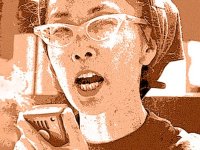Yuri Kochiyama and How Everyone Plays Their Part
Everyone always asks me, "Jose, how can I be a part of this?" Usually, it's in reference to a race discussion that I've ranted about on Twitter or any chapter in my new book This Is Not A Test: A New Narrative on Race, Class, and Education. You're right to feel stuck, especially if your cultural background puts you in the awkward position of having to apologize for a privilege you don't fully comprehend until it's compared to someone else's lot. Perhaps the essential question we should ask ourselves is, "What am I doing to ensure that everyone's humanity is respected as equally, if not more so, than my own?"
To that end, I think of activist Yuri Kochiyama, who passed away on June 1. In case you're not familiar with who she is, Mrs. Kochiyama was a former World War II detainee-turned-activist whose work spanned six decades, and who worked with a vast array of folks. Her most notable contribution to American history was her push for U.S. reparations to the families of Japanese internees during World War II, a de facto apology to Americans of Japanese descent.
How this applies to us is simple. We need to consistently talk about what would help people feel included, whether in our school or in our lives. As daunting as this task is, here are some ways that we can do it.
Keep Both Ears Open
This may seem obvious, but when it comes to sensitive issues, humans have a hard time listening to each other wholeheartedly. Often, the way we learn is by looking at each other and taking time to listen to someone's experiences before inserting our personal biases into a message. Another part of this is to assume good intentions when listening to a message. Cynicism is a byproduct of our personal experience, so rather than negating everything we hear, we should at least understand the point being made in front of us. Is the person speaking to you lodging a concern? Listen, and ask how you can help. Chances are, if someone fully intends to involve you, he or she will want to work with you on possible solutions.
Diversity of Thought and Experience
When people use the word "diversity," we often mean "of color." Yet, more broadly, diversity can mean "different from the usual." In education, if we take a look at everyone around us, does the entire staff look, think, and act similarly? Do they laugh at the same jokes and hang at the same after-school functions? Have they lived in similar conditions? If so, there's nothing wrong with that per se. But our message and being can be strengthened when we're around folks who won’t say "yes" to everything or who have lived through different experiences than everyone else. The more "yes" people you have around you, the harder it becomes when you reach an inevitable and realistic "no."
Voice Is an Agency
After we've created a culture of listening and brought in people from diverse backgrounds, one of the biggest leadership fails in any environment is how a leader might silence people's voices. Some quick examples:
- "That never happens here, so stop saying that!"
- "What are you talking about? Does anyone know what he/she's talking about?"
- "I have x amount of experience and y title, so my voice matters more than yours!"
The ways in which language is powerful enough to spur conversation stands in stark contrast to the ways in which language is used to squelch dissent. In all three examples, we see the person who says these things grasping for his or her given power over the situation and trying to take control where it might not be necessary. Instead of listening to the concern, some folks often disregard it, undercutting the person's confidence that he or she can speak up when other issues arise. We all know the people who consistently complain, yet even their voices have some value.
We just need to learn how to find the right balance between hearing a legitimate complaint and steering the conversation toward solutions. Mrs. Kochiyama's activism was an exercise in this. Activism is a lens for approaching how we live our lives, especially when we don't necessarily "get" another's experience. Throughout Kochiyama's life, we see a woman whose friends spanned many backgrounds. Having such diversity didn't dilute her message -- if anything, it made her new friends, all of whom wanted to push this country toward creating a more humane existence for our most marginalized folks.
Often, this generation of adults likes to say how the youth, especially impoverished youth of color, have lost their way and need to look at heroes like Mrs. Kochiyama. Yet, like many activists, she needed to find her voice. She didn't just find it in the concentration camps of Jerome, Arkansas, but also in 1960s Harlem with Malcolm X. So many of us will miss her voice, but even after her passing, she remains a symbol for the power of collaboration.
